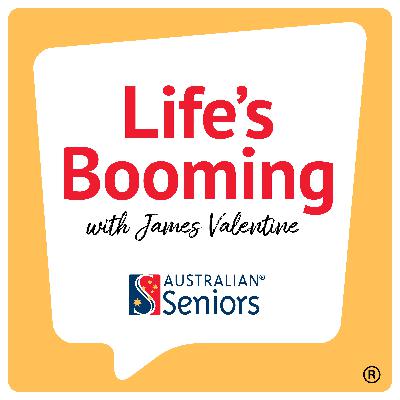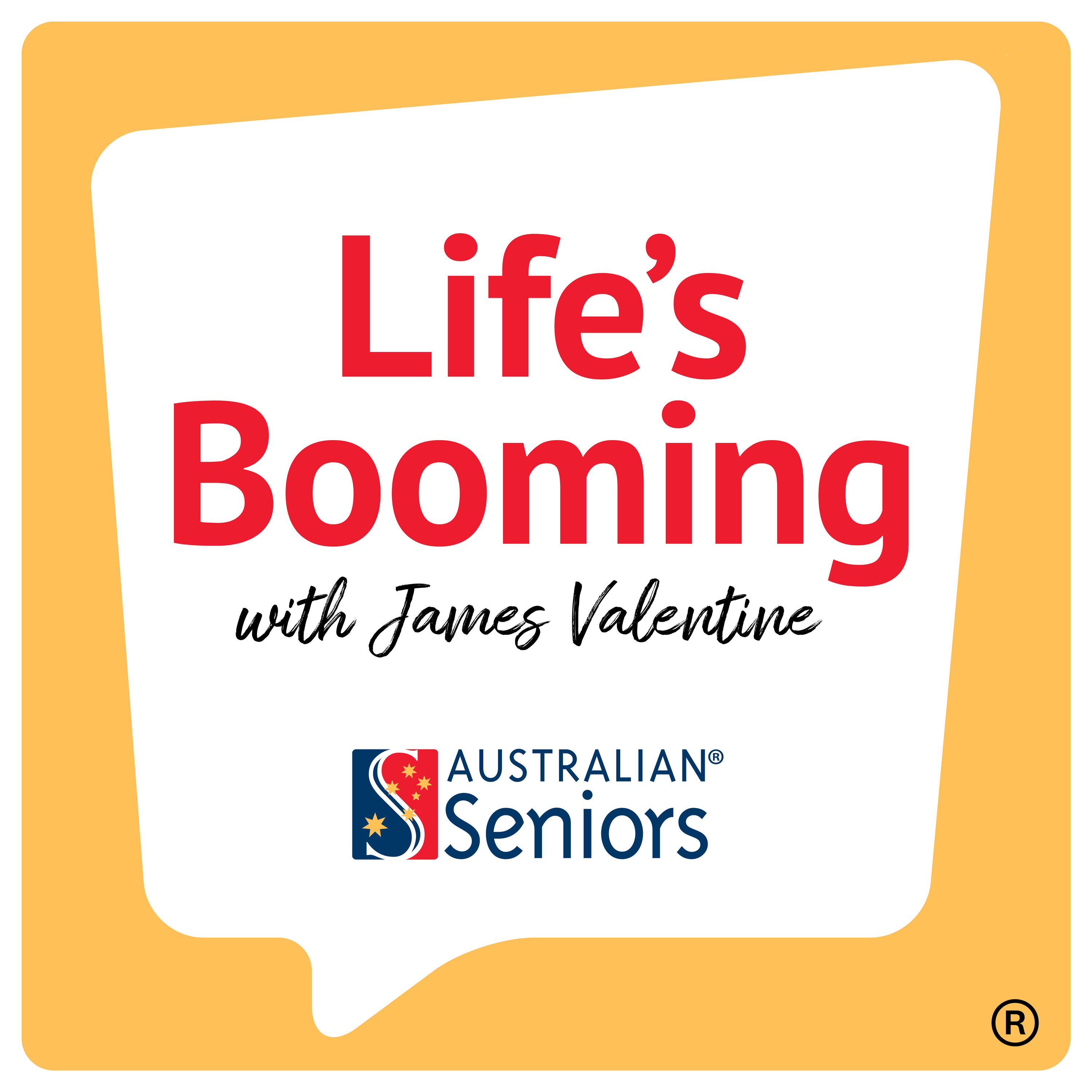Going out with style with Blanche d'Alpuget and Evelyn Calaunan
Description
With most people now preferring to focus on celebrating life rather than mourning at funerals, we explore the new ways people are choosing to commemorate loved ones, and hear first hand experience of what it's like to grieve in the public eye, with acclaimed author Blanche d’Alpuget, widow of former Australian Prime Minister Bob Hawke, and experienced funeral and life celebrant Evelyn Calaunan.
About the episode – brought to you by Australian Seniors.
Join James Valentine for the sixth season of Life’s Booming: Dying to Know, our most unflinching yet. We’ll have the conversations that are hardest to have, ask the questions that are easy to ignore, and hear stories that will make you think differently about the one thing we’re all guaranteed to experience: Death.
Featuring interviews with famous faces as well as experts in the space, we uncover what they know about what we can expect. There are hard truths, surprising discoveries, tears and even laughs. Nothing about death is off the table.
Blanche d’Alpuget is an acclaimed Australian author and the widow of former Prime Minister Bob Hawke. In this episode, Blanche reflects on public and private rituals of mourning, what it means to say goodbye well, and how grief reshapes us. Her latest novel, The Bunny Club (her first murder mystery), is out now.
Evelyn Calaunan is a celebrant who has conducted more than 600 ceremonies, including living funerals that are heartfelt gatherings held before death to honour a life while the person is still present. Drawing on her background in palliative care and community work, Evelyn helps individuals and families create ceremonies that are deeply personal.
If you have any thoughts or questions and want to share your story to Life’s Booming, send us a voice note – lifesbooming@seniors.com.au
Watch Life’s Booming on YouTube
Listen to Life's Booming on Apple Podcasts
Listen to Life's Booming on Spotify
For more information visit seniors.com.au/podcast
Produced by Medium Rare Content Agency, in conjunction with Ampel
--
Disclaimer: Please be advised that this episode contains discussions about death, which may be triggering or upsetting for some listeners. Listener discretion is advised.
If you are struggling with the loss of a loved one, please know that you are not alone and there are resources available. For additional support please contact Lifeline on 131 114 or Beyond Blue on 1300 224 636.
TRANSCRIPT:
S06EP04 Going out with style
James: Hi, I'm James Valentine. Welcome to Life's Booming. This season is Dying to Know. We're having the conversations that are often the hardest to have with people who've experienced life's one great certainty, death.
It touches everyone, but how we honor our loved ones in death is changing, with most of us now preferring to focus on celebrating life rather than mourning at funerals.
So in this episode, we explore some of the new ways people are choosing to commemorate life, as well as hearing first hand experience of what it's like to grieve in the public eye. Generously sharing their professional and personal stories are our guests. Evelyn Calaunan is an experienced celebrant who specialises in living funerals.
And Blanche d’Alpuget is an acclaimed author and widow of former Australian Prime Minister Bob Hawke. Evelyn Blanche, welcome to Life's Booming.
Blanche: Oh, thank you, James.
James: Evelyn, you describe yourself as an end of life celebrant. What exactly does that mean? What do you mean by end of life celebrant?
Evelyn: So I've done, I've done ceremonies, as well. I used to be a wedding celebrant and I've married a few couples where one of the partners was diagnosed with a terminal illness, so I would do the ceremony and that turned out to be sort of a life celebration and they just wanted to marry before one of them died. And then I've done a ceremony where the person was actually dying and we did it.
The end of life sort of life celebration for him. And he passed away, I think, 10 days after, after the ceremony. That's why I think it's, it's best just to celebrate life now, like have those milestone birthdays or whatever birthday number you're turning and have a great party now - why wait till you have a diagnosis or a terminal illness that's looming?
So it's important to have those, those celebrations now. However, in saying that, sometimes people are diagnosed and like, ‘Oh God, I didn't have that party. So I want to have something now.’
I did do a life celebration for my girlfriend who was diagnosed with cancer. And I did a little bit of a ceremony and a ritual and I shared a poem and I was getting a bit too sad for everybody there - cause we were really… It was like a 70s party, we were all dressed up and enjoying each other's company. And then after a while we could tell people were really getting upset because of her diagnosis. And then she came on the microphone. She said, ‘Okay, okay. That's enough, Evelyn, let's go on to karaoke’, you know, so, yeah,
It turned out to be a lovely celebration and she wanted to invite people there from all parts of her life and just be able to have a good party with them while she was still feeling well.
James: Yeah Yeah
Evelyn: And I've done about 600 end of life ceremonies.
James: It just sounds like 600 sounds like a lot
Evelyn: Yeah, but in the context of 17 years, that's really not.
James: I think the thing that struck me about that number was, does it get routine?
Evelyn: Not really. I mean a lot of the script is or the script that I have – I mean, there's only so many ways you can say I'd like to welcome everyone here today. So I'll write a ceremony and I might say, ‘Oh, you know, Joe Blow leaves behind his loving sister’, and then the parents will come back and say, ‘Please take loving out, they couldn't stand each other!’
So, you know, there's a lot of adjectives that are changed because I kind of make my ceremonies quite flowery and people like to change that and make it more real. So yeah.
James: Blanche, you had the experience of, in a way, one of the biggest funerals and biggest moments of public grief in Australian life, the death of Bob Hawke and the funeral and memorial service of Bob Hawke.
How much did you and Bob plan those events together?
Blanche: Not at all. No, no. That was all left up to me.
James: Right. So you planned those events. So my understanding is Bob knew he was dying, right? You knew it was, say, a year before, that kind of thing, you knew it was, it would, it must have been coming.
Blanche: Well, you don't know exactly when. When he started dying, it just fell like an axe. It was very sudden, out of the blue, we were having dinner. And he was in a bad way. He was in a lot of pain from peripheral neuropathy, so he was on morphine tablets and the fentanyl patches. Obviously it was going to be at some stage, but suddenly we're having dinner and we finished dinner and he got up from dinner and he actually went into the living room and actually threw up and he was in enormous pain, suddenly.
And he got on the floor and said, ‘Oh, it's unbearable. The pain's unbearable’. And I said to him, ‘Yes, Bob, you're dying.’ And that was, so that was the beginning.
James: How did he take that? Like, how did he take his death? So the, the imminence of his death?
Blanche: Well, he'd said all along, I have no fear of death. And I used to think all along, wait until you get there.
[laughter]
It's one thing, not fearing death. It's another thing fearing dying, and dying can be difficult. Being born is difficult, life is difficult, and dying can be difficult too. But then I think it's wonderful, when you actually… Because I believe in the spirit and the soul, and I've seen enough of people dying to be convinced of it, there's an absolutely uplifting feeling as, as it goes, as it leaves the body.
James: What did he believe, particularly at that point?
Blanche: I sort of badgered him with my ideas for 25 years, so [laughter]. He'd started off an agnostic and he was still probably agnostic, but when he died, he wasn't.
I mean, I could see it on his face. He didn't say, ‘Oh my God, I can, I see heaven’. But there was such a heavenly look on his face. As I saw on my mother's face.
James: What do you see, Evelyn, the difference between, do you see a difference between those who are dying and have belief and faith and those who don’t. How does that express itself?
How do you see it play out?
Evelyn: What I've seen or what I've experienced talking to families is that that they could see at the end that they, if they were quite sick, cause I always ask, I always ask my families, how was it the last few days? And they always say to me, that, you know, just about a few days before they died, they had this really






